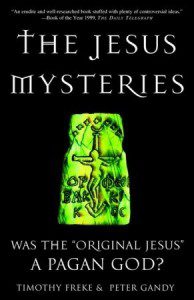 Jesus has always occupied a strange place in my life. When I was younger I counted myself as one of his followers, and in high school I remember accepting him as “my personal lord and savior.” When I look back on my experiences with Jesus these many years later I’m always struck by how un-personal that relationship always seemed to be. Growing up near the buckle on the Bible Belt (just outside of Nashville Tennessee) my perception of Jesus was continually governed by others. It was dictated by my church, the Christian media, and an assortment of authority figures including the husband of my school bus driver.
Jesus has always occupied a strange place in my life. When I was younger I counted myself as one of his followers, and in high school I remember accepting him as “my personal lord and savior.” When I look back on my experiences with Jesus these many years later I’m always struck by how un-personal that relationship always seemed to be. Growing up near the buckle on the Bible Belt (just outside of Nashville Tennessee) my perception of Jesus was continually governed by others. It was dictated by my church, the Christian media, and an assortment of authority figures including the husband of my school bus driver.
If a relationship is going to be “personal” it should probably be somewhat organic. Jesus never called to me, Pan and a few other Pagan gods did, and loudly. There was no intermediary looking to set me up with Cernunnos, Jesus always seems to have someone running interference for him. “Have you accepted Jesus?” “Can I talk to you about Jesus?” “Let me ask you something about Jesus . . .” The difference in all of those scenarios is that it’s never Jesus asking, it’s always a person. In Paganism, no one is preaching on behalf of a certain god. Deity finds you. It’s a completely different set up.
I still remember the day I “took Jesus into my heart.” It was a cloudy and cool Good Friday back in 1990, and the music in my car’s tape deck was Heart’s Bad Animals album. My church sponsored an annual Passion Play on that day every year so it was a day teeming with religious overtones. It was an acquaintance of mine who urged me to “accept Jesus,” and I remember doing it in the hopes of feeling something. One of the most disappointing things about Christianity for me at the time was just how unexciting the entire experience was. Church was an exercise in talking at God instead of talking to God, and there is a difference. I was hopeful that by accepting Jesus, Christianity would become more meaningful, I don’t think that it did.
 I remember trying to sit down and talk to Jesus, but found it all very confusing, especially after reading the Bible. Was I talking to the guy who said: “Truly I tell you, whatever you did for one of the least of these brothers and sisters of mine, you did for me,” or was I talking to the guy that many of my friends believed was out to get “welfare queens?” Jesus said a lot of rather nice stuff in the New Testament, but later books say some rather unenlightened things. Here’s a little passage from First Timothy that’s clownish in its stupidity and mean spiritedness: “Let the woman learn in silence with all subjection. But I suffer not a woman to teach, nor to usurp authority over the man, but to be in silence.” I had a lot of growing up to do at 17, but even then I knew that “subjection” was probably not a very good idea.
I remember trying to sit down and talk to Jesus, but found it all very confusing, especially after reading the Bible. Was I talking to the guy who said: “Truly I tell you, whatever you did for one of the least of these brothers and sisters of mine, you did for me,” or was I talking to the guy that many of my friends believed was out to get “welfare queens?” Jesus said a lot of rather nice stuff in the New Testament, but later books say some rather unenlightened things. Here’s a little passage from First Timothy that’s clownish in its stupidity and mean spiritedness: “Let the woman learn in silence with all subjection. But I suffer not a woman to teach, nor to usurp authority over the man, but to be in silence.” I had a lot of growing up to do at 17, but even then I knew that “subjection” was probably not a very good idea.
Even with my misgivings I held on for awhile. Jesus was the socially acceptable thing to do after all, and at the time I only had a vague inkling that there were alternatives. (It’s one thing to study or learn about other religions, accepting another one is something completely different.) Besides, even though I was uncomfortable with the New Testament (and large swaths of the Old/Torah) I still liked what Jesus had to say in those four little mini-biographies written about him. Perhaps I could make it work after all.
 Of course it didn’t work out, but I kept trying. Even after becoming a Pagan I looked in vain for a way to shoe-horn Jesus into my new religious life. One of the things that has made Jesus such an effective (and often bewildering) figure the last 1700 years is how adaptable he is. People force him into Tea Party boxes and others argue that he was an avatar of Krishna, if you look hard enough you might be able to find a Jesus made just for you. I started with the Jesus next to the Wicca books in the New Age section of my local bookstore. I read books like Holy Blood, Holy Grail (by Baigent, Lincoln, and Leigh) hoping to find a more knowable and human Jesus in their pages. He’s there of course, but to me it was unsatisfying as Mainline Protestant Jesus.
Of course it didn’t work out, but I kept trying. Even after becoming a Pagan I looked in vain for a way to shoe-horn Jesus into my new religious life. One of the things that has made Jesus such an effective (and often bewildering) figure the last 1700 years is how adaptable he is. People force him into Tea Party boxes and others argue that he was an avatar of Krishna, if you look hard enough you might be able to find a Jesus made just for you. I started with the Jesus next to the Wicca books in the New Age section of my local bookstore. I read books like Holy Blood, Holy Grail (by Baigent, Lincoln, and Leigh) hoping to find a more knowable and human Jesus in their pages. He’s there of course, but to me it was unsatisfying as Mainline Protestant Jesus.
I turned next to the favorite Jesus of many Modern Pagans; Jesus as the “Divine God-Man” more Dionysus than Yahweh, and the latest in a series of never-ending and always related pagan dying and resurrecting gods. This is the Jesus written about in books like The Jesus Mysteries: Was the “Original Jesus” a Pagan God? and seen in movies like Zeitgeist. I’ll admit that the books and the movie are both entertaining, but the information in them doesn’t stand up in scholarly circles*. Jesus was not a pagan god of antiquity, and while his myth was most certainly influenced by the paganisms of the late Roman Empire, that wasn’t the only influence or even the over-riding one.
 Mary Magdalene as the wife of Jesus was my last attempt to hold onto Jesus as some sort of divine figure. While many academics are doubtful that Jesus was married (ignore what you read in Holy Blood Holy Grail), it’s not anything that can really be proven or disproven. But so what? If Jesus was married that just makes him a guy with a wife, it doesn’t suddenly turn him into a pagan priest or a divine figure. My stupid rational mind threw that one away too. My approach to Jesus isn’t that much different than my approach to Pagan history, meaning it’s conservative, respectful, and most likely to follow the path that seems the most probable. The more miraculous something sounds, the less likely it is to be true.
Mary Magdalene as the wife of Jesus was my last attempt to hold onto Jesus as some sort of divine figure. While many academics are doubtful that Jesus was married (ignore what you read in Holy Blood Holy Grail), it’s not anything that can really be proven or disproven. But so what? If Jesus was married that just makes him a guy with a wife, it doesn’t suddenly turn him into a pagan priest or a divine figure. My stupid rational mind threw that one away too. My approach to Jesus isn’t that much different than my approach to Pagan history, meaning it’s conservative, respectful, and most likely to follow the path that seems the most probable. The more miraculous something sounds, the less likely it is to be true.
One of the things many of my Christian friends don’t understand about Modern Paganism is that there is no “renouncing” of anything. I have had a few Christians ask me “when did you renounce Jesus?” with the answer being “I have never renounced Jesus.” Acceptance of the new does not necessarily result in rejection of the old. Jesus has gone from being my “lord and savior” to being a “dying and resurrecting pagan god” to being the happily married husband of Mary Magdalene. These days he’s none of those things, he’s simply a wise-man, and an apocalyptic preacher who believed that the end of the world was nigh and that people should probably be a little bit more decent to each other.
 I have theories about the gods and when something or someone reaches the status of deity, but it’s not my place to say whether or not Jesus the man is now divine in some way. Lots of people pray to him and are comforted by it, that’s mostly a good thing as long as they are treating those around them with decency and respect. No matter what I did, when I prayed to him I was met only by silence. I think that means it’s best to move on.
I have theories about the gods and when something or someone reaches the status of deity, but it’s not my place to say whether or not Jesus the man is now divine in some way. Lots of people pray to him and are comforted by it, that’s mostly a good thing as long as they are treating those around them with decency and respect. No matter what I did, when I prayed to him I was met only by silence. I think that means it’s best to move on.
*If you like the ideas found in things like Zeitgeist you are welcome to go on believing them, but the majority of serious Bible scholars discount them entirely. If it makes you feel better Bible scholars also discount the virgin birth and the resurrection.

















